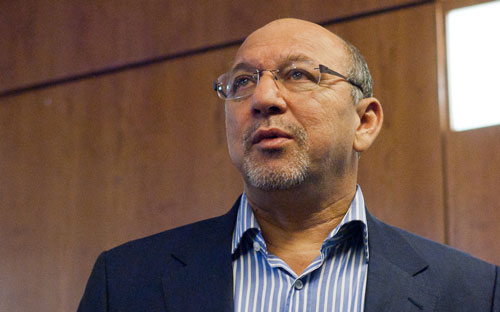
The National Planning Commission’s long-awaited National Development Plan for 2030, handed to President Jacob Zuma on Friday, has come out strongly in favour of market competition in the telecommunications industry, advocating spectrum trading and raising the idea of structurally separating Telkom into two businesses.
The 430-page document, which deals with every sector of the economy and makes far-reaching proposals to eradicate poverty and set the country on a higher growth path, is forthright when it comes to the problems affecting the information and communications technology (ICT) industry and recommends a range of largely market-friendly interventions to maximise the potential of the sector.
The commission is headed by minister in the presidency Trevor Manuel and consists of 26 people appointed by Zuma to advise on issues impacting on long-term development in SA.
The report raises the possibility of separating Telkom’s facilities (networks) and services businesses to facilitate competition in the fixed-line market, saying the operator’s “dominance” as the “historical incumbent in the backbone and local access markets” has been “relatively inefficiently regulated and has resulted in very high input costs for business, increasing the cost of services”.
This, the report says, has “inhibited investment in growth areas within ICT such as business process outsourcing and offshore IT-enabled services”. It points to the BT Group (formerly British Telecom) example, where the UK regulator (now Ofcom) forced BT to spin off management of its access network into a separate company called Openreach. The commissions describes this as a “successful” model.
It proposes a review of the market structure and an analysis of the benefits and costs of infrastructure duplication, facilities- or service-based competition, and options for infrastructure sharing. It talks about the possibility of “structural separation of the vertically integrated incumbent backbone operator”.
Open-access policies are mooted, where sharing of infrastructure is incentivised “without discouraging private long-term investment”.
The report raises the “structural conflict of interest” between the state’s role as a competitive player in the market through its shareholding in Telkom and as a policy maker for itself and its competitors. It advocates “better distinction of roles and functions, more coherent approaches and clearer strategies” to avoid “unintended policy outcomes”.
It also wants a review of state-owned enterprises in the sector to determine if they are “fulfilling their purposes, constraining competition, squeezing out private investment or not engaged in efficient expansion”.
“SA needs to express an unambiguous commitment to intensifying competition,” the report says. “As one element of this, local-loop unbundling needs to be speeded up.”
In future, it says, the state’s “primary role in the ICT sector will be to facilitate competition and private investment and to ensure effective regulation where market failure is apparent”.
“Direct involvement [by government] will be limited to interventions needed to ensure universal access, such as the introduction of ‘smart subsidies’, and to help marginalised communities develop the capacity to use ICTs effectively.”
The commission says the so-called “digital divide” can be addressed partially through “more competitive (efficient) markets and effective regulation that enable operators to meet the demand for affordable services, reducing the number of households or individuals requiring support”.
It says further strategies that promote access through “smart subsidies” should be a “once-off intervention” rather than requiring permanent subsidies.
The commission’s report says there are a number of areas that need attention, including adjusting market structures and removing legal constraints to allow for full competition in services. It also wants a review of “institutional arrangements” to ensure regulatory agencies are sufficiently resourced to encourage new competitors and ensure fair competition and to regulate market failure.
Spectrum should also be made available “urgently” for next-generation services, though some could be allocated with “set-asides or obligations to overcome historical legacies and inequalities in the sector”. However, this should “not delay its competitive allocation”.
The spectrum that will become available through the migration from analogue to digital terrestrial television should also be “swiftly allocated”.
“Mechanisms for allocating radio frequency spectrum need to be smarter — for example, spectrum auctions and reverse bids for underserviced areas — with robust and transparent governance,” the report says. “Spectrum should be fully tradeable once allocated.”
In addition, regulations should be crafted to “discourage spectrum hoarding”.
“Spectrum policy should favour competition, but incumbents should not be excluded from gaining access to bands they need to build networks using new technologies,” it continues. “In line with global trends, spectrum licences should be technology neutral, so they can be adapted to meet rapidly changing technological developments within the sector without high regulatory costs.”
The commission’s report paints a poor picture of the state’s attempts to intervene in the sector, saying “most state interventions in the ICT sector have been disappointing” with SA losing its status as “continental leader in Internet and broadband connectivity”.
“Policy constraints, weaknesses in institutional arrangements, conflicting policies between responsible departments, regulatory failure and limited competition all contribute to this issue,” it says. “The ability of the regulator, the Independent Communications Authority of SA, to enable a more open market has been hampered by legal bottlenecks [and] limited capacity and expertise.”
The report says the last comprehensive policy review of the sector happened in 1996, and a new review is urgently required. — Duncan McLeod, TechCentral
- Subscribe to our free daily newsletter
- Follow us on Twitter or on Facebook
- Visit our sister website, SportsCentral (still in beta)




